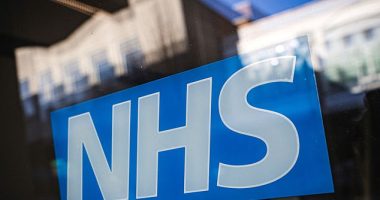
Patients are costing the NHS millions of pounds a year by turning up for operations too unfit to go under the knife, a damning report reveals.
It says doctors are forced to cancel around 135,000 surgical procedures on the day each year, at a cost of £400million in lost theatre time.
A third of these are for potentially avoidable clinical reasons, including patients being unprepared for surgery or having unaddressed co-morbidities.
Now the Centre for Perioperative Care (CPOC), is calling for waiting lists to be renamed ‘preparation lists’, with sick Britons ordered to get themselves into shape following a referral for surgery.
Long waits for care provide an opportunity for people to increase their physical activity, improve their diet and quit smoking, the alliance of medical groups adds.
Patients can also use the time to get other health issues under control and prepare mentally for the procedure and rehabilitation.
The CPOC’s ‘Blueprint for NHS efficiency’ report says: ‘The NHS has too many cancellations, complications, and lengthy hospital stays – often due to patients arriving for surgery in an unfit state.
‘These can be avoided by concerted action to turn waiting lists into preparation lists, including screening and actively supporting patients to improve and maintain their health while they wait.
‘If patients have addressable health issues they should be offered help to tackle these, including through “prehabilitation” programmes, which could involve support for exercise, smoking cessation and much else.
‘This is not, and should not be, about erecting barriers to surgery: it is about giving patients the support they need to prepare themselves as best they can.’
The CPOC says preparation for surgery reduces complications by 30 to 80 per cent and reduces the length of time patients spend in hospital by one to two days.
It also wants hospitals to place a greater focus on rehabilitation, with patients encourage to drink, eat and move as soon as possible after surgery.
And it says better discharge planning can reduce re-admissions by 11.5 per cent, which may reduce waiting lists and costs.
Dr David Selwyn, director of CPOC, said: ‘NHS waiting lists are at record levels but could be cut drastically by transforming the surgical pathway.
‘The NHS could vastly improve its efficiency, and improve patient outcomes, by turning waiting lists into preparation lists, taking simple steps to get patients drinking, eating, and mobilising after surgery and better discharge planning.
‘The potential for the NHS to increase the number of successful operations and save millions of pounds is huge, but first we need some additional investment to turn pockets of best practice into a transformation of how we care for patients.
‘The evidence for these interventions is there, we just need to get them implemented.’
The CPOC says implementing these policies would save the NHS money but claims set-up costs are a barrier.
It would like the Government to invest in a £100 million ‘NHS efficiencies transformation fund’, which would be allocated to Trusts to implement the proposals.
The CPOC is led by the Royal College of Anaesthetists in partnership with other colleges, including the Royal College of Surgeons of England, the Royal College of Nursing and the Royal College of General Practitioners.
An NHS England spokesperson said: ‘As part of our Elective Recovery Plan, specialist nurses, care co-ordinators and doctors offer personalised plans for patients ahead of their surgical procedure, which can include support to stop smoking, lose weight, and assistance with mental health – boosting people’s chances of recovering quickly and helping cut the number of operations that are cancelled on the day.’
Source: Mail Online









